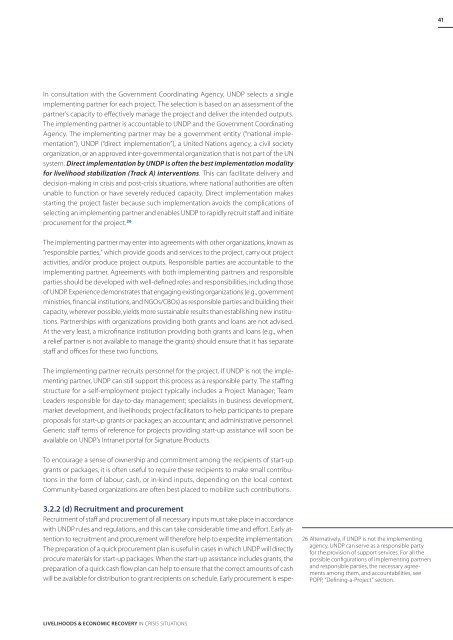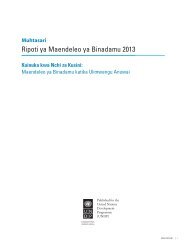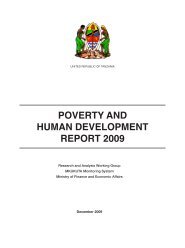Download PDF (4.08 MB) - ReliefWeb
Download PDF (4.08 MB) - ReliefWeb
Download PDF (4.08 MB) - ReliefWeb
Create successful ePaper yourself
Turn your PDF publications into a flip-book with our unique Google optimized e-Paper software.
41<br />
In consultation with the Government Coordinating Agency, UNDP selects a single<br />
implementing partner for each project. The selection is based on an assessment of the<br />
partner’s capacity to effectively manage the project and deliver the intended outputs.<br />
The implementing partner is accountable to UNDP and the Government Coordinating<br />
Agency. The implementing partner may be a government entity (“national implementation”),<br />
UNDP (“direct implementation”), a United Nations agency, a civil society<br />
organization, or an approved inter-governmental organization that is not part of the UN<br />
system. Direct implementation by UNDP is often the best implementation modality<br />
for livelihood stabilization (Track A) interventions. This can facilitate delivery and<br />
decision-making in crisis and post-crisis situations, where national authorities are often<br />
unable to function or have severely reduced capacity. Direct implementation makes<br />
starting the project faster because such implementation avoids the complications of<br />
selecting an implementing partner and enables UNDP to rapidly recruit staff and initiate<br />
procurement for the project. 26<br />
The implementing partner may enter into agreements with other organizations, known as<br />
“responsible parties,” which provide goods and services to the project, carry out project<br />
activities, and/or produce project outputs. Responsible parties are accountable to the<br />
implementing partner. Agreements with both implementing partners and responsible<br />
parties should be developed with well-defined roles and responsibilities, including those<br />
of UNDP. Experience demonstrates that engaging existing organizations (e.g., government<br />
ministries, financial institutions, and NGOs/CBOs) as responsible parties and building their<br />
capacity, wherever possible, yields more sustainable results than establishing new institutions.<br />
Partnerships with organizations providing both grants and loans are not advised.<br />
At the very least, a microfinance institution providing both grants and loans (e.g., when<br />
a relief partner is not available to manage the grants) should ensure that it has separate<br />
staff and offices for these two functions.<br />
The implementing partner recruits personnel for the project. If UNDP is not the implementing<br />
partner, UNDP can still support this process as a responsible party. The staffing<br />
structure for a self-employment project typically includes a Project Manager; Team<br />
Leaders responsible for day-to-day management; specialists in business development,<br />
market development, and livelihoods; project facilitators to help participants to prepare<br />
proposals for start-up grants or packages; an accountant; and administrative personnel.<br />
Generic staff terms of reference for projects providing start-up assistance will soon be<br />
available on UNDP’s Intranet portal for Signature Products.<br />
To encourage a sense of ownership and commitment among the recipients of start-up<br />
grants or packages, it is often useful to require these recipients to make small contributions<br />
in the form of labour, cash, or in-kind inputs, depending on the local context.<br />
Community-based organizations are often best placed to mobilize such contributions.<br />
3.2.2 (d) Recruitment and procurement<br />
Recruitment of staff and procurement of all necessary inputs must take place in accordance<br />
with UNDP rules and regulations, and this can take considerable time and effort. Early attention<br />
to recruitment and procurement will therefore help to expedite implementation.<br />
The preparation of a quick procurement plan is useful in cases in which UNDP will directly<br />
procure materials for start-up packages. When the start-up assistance includes grants, the<br />
preparation of a quick cash flow plan can help to ensure that the correct amounts of cash<br />
will be available for distribution to grant recipients on schedule. Early procurement is espe-<br />
26 Alternatively, if UNDP is not the implementing<br />
agency, UNDP can serve as a responsible party<br />
for the provision of support services. For all the<br />
possible configurations of implementing partners<br />
and responsible parties, the necessary agreements<br />
among them, and accountabilities, see<br />
POPP, “Defining-a-Project” section.<br />
Livelihoods & Economic Recovery in Crisis Situations





